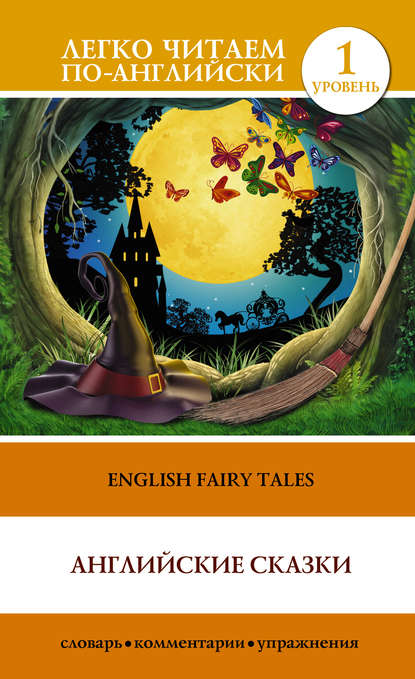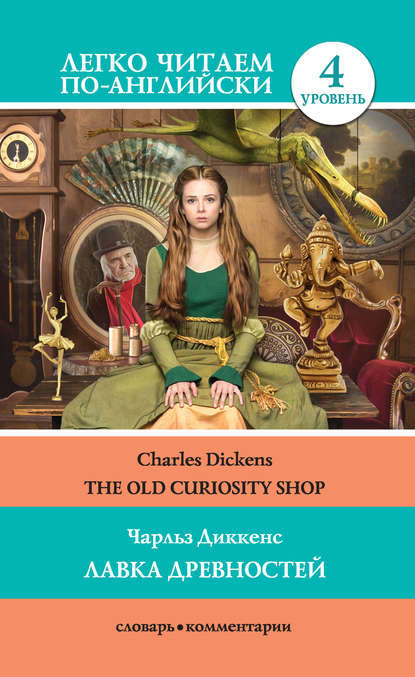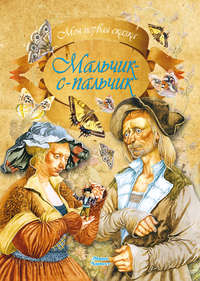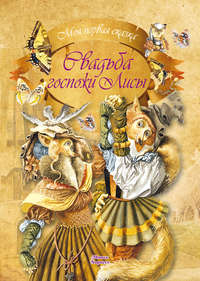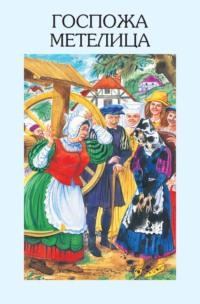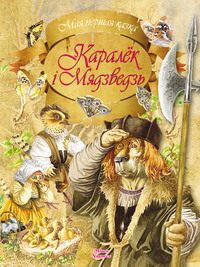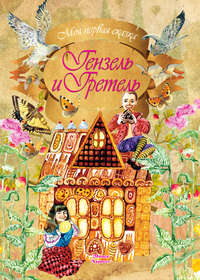
Полная версия
Страшные сказки / Scary stories
“Sorrowful, pick up your father’s handkerchief, and cover his face again”.
The child picked it up, and put it over his face again. The King in his sleep heard what passed, and threw the handkerchief away once more. But the child grew impatient, and said,
“Dear mother, how can I cover my father’s face when I have no father in this world? I only know the prayer, ‘Our Father, which is in Heaven’. My father is in Heaven, and is the good God. How can I know a wild man like this? He is not my father!”
When the King heard that, he got up, and asked who they were.
Then said she, “I am your wife, and that is thy son, Sorrowful”.
And he saw her hands, and said,
“My wife had silver hands”.
She answered,
“The good God gave me new hands”.
The angel went into the room, and brought the silver hands, and showed them to him. Hereupon he knew for a certainty that it was his dear wife and his dear child, and he kissed them.
Then the angel of God gave them one meal with her, and after that they went home to the
King’s old mother. The King and Queen were married again, and lived contentedly to their happy end.
Bluebeard
Charles Perrault
There was once a man who had fine houses, both in town and country, silver and gold plates, nice furniture, and coaches gilded all over with gold. But this man was very unlucky because he had a blue beard, which made him so frightfully ugly that all the women and girls ran away from him.
One of his neighbors, a lady of quality[14], had two daughters who were very beautiful. He desired to marry one of them. Neither of them wanted to marry him, and they sent him backwards and forwards from one to the other. They did want to have a husband with a blue beard. Furthermore, he was already married to several wives, and nobody knew what became of them.
Blue Beard invited these girls, with their mother and three or four other ladies, with other young people of the neighborhood, to one of his country houses, where they stayed a whole week.
The time was filled with parties, hunting, fishing, dancing, mirth, and feasting. Everything succeeded so well that the youngest daughter began to think that the man’s beard was not so very blue after all, and that he was a gentleman.
As soon as they returned home, the marriage was concluded. About a month afterwards, Blue Beard told his wife that he was obliged to take a country journey for six weeks at least. He desired her to divert herself in his absence, to send for her friends and acquaintances, to take them into the country, if she pleased, and to do whatever she wanted.
“Here”, said he, “are the keys to the two great wardrobes, wherein I have my best furniture. These are to my silver and gold plates. These open my strongboxes, which hold my money, both gold and silver; these my caskets of jewels. And this is the master key to all my apartments. But look at this little key. It is the key to the closet at the end of the great hall on the ground floor. Open them all; go into each and every one of them, except that little closet, which I forbid you. If you open it, you will expect my anger and resentment”.
She promised to observe, very exactly, his orders. Then he embraced her, got into his coach and proceeded on his journey.
Soon her neighbors and good friends arrived. They were impatient to see all the rich furniture of her house. They did not come while her husband was there, because of his blue beard, which frightened them. They ran through all the rooms, closets, and wardrobes, which were all fine and very rich indeed.
After that, they went up into the two great rooms, which contained the best and richest furniture. They admired the number and beauty of the tapestry, beds, couches, cabinets, stands, tables, and looking glasses, in which they could see themselves from head to foot.
They extolled and envied the happiness of their friend, who in the meantime in no way diverted herself. She was impatient to go and open the closet on the ground floor. She was so much pressed by her curiosity that she went down a little back staircase, and with such haste that she nearly fell and broke her neck.
She came to the closet door, made a stop for some time, thought about her husband’s orders, and considered to be a little disobedient. The temptation was so strong that she could not overcome it. She then took the little key, and opened it. At first she could not see anything plainly, because the windows were shut. After some moments she began to perceive that the floor was all covered over with blood, on which lay the bodies of several dead women. These were all the wives whom Blue Beard married and murdered, one after another. She was very afraid, and the key fell out of her hand.
She picked up the key, locked the door, and went upstairs into her chamber. But she was frightened very much. She observed that the key to the closet was stained with blood. She tried two or three times to wipe it off; but the blood did not come out. She washed the key in vain, and even rubbed it with soap and sand. The blood still remained, for the key was magical and she could never make it clean. When the blood was gone off from one side, it came again on the other.
Blue Beard returned from his journey the same evening. His wife tried to convince him that she was extremely happy about his return.
The next morning he asked her for the keys, which she gave him. He easily guessed what happened.
“What!” said he, “is not the key of my closet among the rest?”
“I left it”, said she, “upstairs upon the table”.
“Bring it to me!” said Blue Beard, “At once!”
She went backwards and forwards, and finally brought him the key. Blue Beard looked at it very attentively and said to his wife,
“Why is there blood on the key?”
“I do not know”, cried the poor woman, paler than death.
“You do not know!” replied Blue Beard. “I very well know. You went into the closet, did you not? Very well, madam; you’ll go back, and take your place among the ladies you saw there”.
Upon this she begged his pardon with all the signs of a true repentance. She promised him to be obedient. She was beautiful and sorrowful; but Blue Beard had a heart harder than any rock!
“You must die, madam”, said he, “at once”.
“Since I must die”, answered she, “give me some time to say my prayers”.
“I give you”, replied Blue Beard, “seven minutes, but not one moment more”.
When she was alone she called out to her sister, and said to her,
“Sister Anne, go up, I beg you, to the top of the tower, and tell me: are there my brothers on the way? They promised me to come today, and if you see them, give them a sign to make haste”.
Her sister Anne went up to the top of the tower, and the poor wife cried out from time to time,
“Anne, sister Anne, do you see anyone?”
And sister Anne said,
“I see nothing but a cloud of dust in the sun, and the green grass”.
In the meanwhile Blue Beard took a great saber, and cried out,
“Come down instantly, or I shall come up to you”.
“One moment longer, if you please”, said his wife; and then she cried out very softly, “Anne, sister Anne, do you see anybody on the road?”
And sister Anne answered,
“I see nothing but a cloud of dust in the sun, and the green grass”.
“Come down quickly!” cried Blue Beard, “or I shall come up to you!”
“One moment”, answered his wife; and then she cried, “Anne, sister Anne, do you not see anybody on the road?”
“I see”, replied sister Anne, “a great cloud of dust”.
“Are they my brothers?”
“Alas, no my dear sister, I see a flock of sheep”.
“Will you not come down?” cried Blue Beard.
“One moment longer”, said his wife, and then she cried out, “Anne, sister Anne, do you see anybody on the road?”
“I see”, said she, “two horsemen, but they are still far away”.
“God be praised![15]” replied the poor wife joyfully. “They are my brothers. I will make them a sign to make haste”.
Then Blue Beard bawled out so loud that he the whole house trembled. The distressed wife came down, and threw herself at his feet, all in tears, with her hair about her shoulders.
“This means nothing”, said Blue Beard. “You must die!”
Then he took her hair with one hand, and lifted up the sword with the other. He prepared to strike off her head. The poor lady turned about to him, and looked at him sorrowfully.
At this instant there was such a loud knocking at the gate that Blue Beard made a sudden stop. The gate was opened, and two horsemen entered. They drew their swords, and ran directly to Blue Beard. He knew them: they were his wife’s brothers, one a dragoon, the other a musketeer. Blue Beard he ran away immediately to save himself; but the two brothers pursued and overtook him. Then they ran their swords through his body and killed him. The poor wife was almost as dead as her husband, and had not strength enough to rise and welcome her brothers.
Blue Beard had no heirs, and so his wife became mistress of all his estate. She gave one part of it to her sister Anne; another part to buy captains’ commissions[16] for her brothers, and the rest to marry herself to a very worthy gentleman. She wanted to forget the ill time with Blue Beard.
The Death of the Little Hen
Brothers Grimm
Once upon a time the little hen went with the little cock to the nut-hill[17]. They made an agreement. Which of them finds a kernel of a nut will share it with the other.
Then the hen found a large, large nut, but said nothing about it. She intended to eat the kernel herself. The kernel, however, was so large that she could not swallow it. So it remained sticking[18] in her throat. The hen was alarmed. Then she cried,
“Cock, please run fast and fetch me some water, or I shall choke!”
The little cock ran as fast as he could to the spring, and said,
“Stream, give me some water; the little hen is on the nut-hill. She will choke!”
The well answered,
“First run to the bride, and ask her to give you some red silk”.
The little cock ran to the bride and said,
“Bride, give me some red silk! I want to give red silk to the well, the well will give me some water. I’ll take the water to the little hen who is on the nut-hill. She will choke!”
The bride answered,
“First run and bring me my little wreath which hangs on a willow”.
So the little cock ran to the willow, and drew the wreath from the branch and took it to the bride. The bride gave him some water for it. Then the little cock took the water to the hen. But the hen choked in the meantime, and lay there dead and motionless. Then the cock was so distressed that he cried aloud. Every animal came to lament the little hen. Six mice built a little carriage to carry her to her grave. When the carriage was ready they harnessed themselves to it, and the cock drove. On the way, however, they met the fox, who said,
“Where do you go, little cock?”
“I go to bury my little hen”.
“May I drive with you?”
“Yes, but seat thyself at the back of the carriage, for in the front my little horses could not drag you”.
Then the fox seated himself at the back, and after that the wolf, the bear, the stag, the lion, and all the beasts of the forest did the same. Then the procession went onwards, and they reached the stream.
“How will we get over?” said the little cock.
A straw was by the stream, and it said,
“I will lay myself across, and you will drive over me”.
But when the six mice came to the bridge, the straw slipped and fell into the water. The six mice all fell in and were drowned.
Then they were again in difficulty, and a coal came and said,
“I am large enough. I will lay myself across and you will drive over me”.
So the coal also laid itself across the water, but unhappily just touched it, on which the coal hissed, was extinguished and died.
When a stone saw that, it took pity on the little cock, wished to help him, and laid itself over the water. Then the cock drew the carriage himself, but when he got it over and reached the other shore with the dead hen, and was about to draw over the others, there were too many of them. The carriage ran back, and they all fell into the water together, and were drowned.
Then the little cock was left alone with the dead hen, and dug a grave for her and laid her in it. He made a mound above it, on which he sat down and fretted until he died too, and then every one was dead.
The Red Shoes
Hans Christian Andersen
There was once a little girl, very nice and very pretty, but so poor that she went barefooted all summer. And in winter she wore thick wooden shoes that chafed her ankles until they were red.
In the middle of the village lived Old Mother Shoemaker. She took some old scraps of red cloth and made them into a little pair of shoes. They were a bit clumsy, but she intended to give them to the little girl. Karen was the little girl’s name.
The first time Karen wore her new red shoes was on the very day when her mother was buried. Of course, they were not right for mourning, but they were all she had. So she put them on and walked barelegged after the plain wicker coffin.
Just then a large old carriage came by, with a large old lady inside it. She looked at the little girl and took pity upon her[19]. And she went to the parson and said:
“Give the little girl to me, and I shall take good care of her[20]”.
Karen was sure that this happened because she wore red shoes. But the old lady said the shoes were hideous, and burned them. She gave Karen new clothes. She taught Karen to read and to sew. People said she was pretty, but her mirror told her,
“You are more than pretty. You are beautiful”.
It happened that the Queen travelled through the country with her little daughter, who was a Princess. Karen went with all the people to see them at the castle. The little Princess was dressed in white. She came to the window. She didn’t wear a train[21], and she didn’t wear a gold crown. But she wore a pair of splendid red morocco shoes. Of course, they were much nicer than the ones Old Mother Shoemaker made for little Karen. There’s nothing in the world like a pair of red shoes!
When Karen was old enough, they made new clothes for her. She got new shoes. They went to the house of a thriving shoemaker, to take the measure of her little feet. In his shop were big glass cases, filled with the prettiest shoes and the shiniest boots. They looked most attractive but, the old lady did not see very well, and they did not attract her. Among the shoes there was a pair of red leather ones which were just like those the Princess had worn. How perfect they were! The shoemaker made them for the daughter of a count, but they did not quite fit her.
“They shine so brightly!” said the old lady.
“Yes, indeed they shine”, said Karen.
As the shoes fitted Karen, the old lady bought them. But she had no idea they were red.
They went to the church. Everyone looked at her feet. When she walked up the aisle to the chancel of the church, it seemed to her as if even those portraits of bygone ministers and their wives, in starched ruffs and long black gowns fixed their eyes upon her red shoes. She could think of nothing else, even when the pastor laid his hands upon her head and spoke of God and her duty as a Christian. The solemn organ rolled, the children sang sweetly, and the old choir leader sang too. But Karen thought of nothing except her red shoes.
Before the afternoon was over, the old lady heard from everyone in the parish that the shoes were red. She told Karen it was naughty to wear red shoes to church. Highly improper! In the future she will always wear black shoes to church, even though they were her old ones.
Next Sunday there was holy communion. Karen looked at her black shoes. She looked at her red ones. She looked at her red ones again – and she put them on.
It was a fair, sunny day. Karen and the old lady took the path through the cornfield, where it was rather dusty. At the church door they met an old soldier. He stood with a crutch and wore a long, curious beard. It was more reddish than white. In fact it was quite red. He bowed down to the ground, and asked the old lady to dust her shoes. Karen put out her little foot too.
“Oh, what beautiful shoes for dancing”, the soldier said. “Never come off when you dance”, he told the shoes, as he tapped the sole of each of them with his hand.
The old lady gave the soldier a penny, and went on into the church with Karen. All the people there stared at Karen’s red shoes, and all the portraits stared too. When Karen knelt at the altar rail, and even when the chalice came to her lips, she could think only of her red shoes. She forgot to sing the psalm. She forgot to say the Lord’s Prayer.
Then church was over, and the old lady got into her carriage. Karen lifted her foot to step in after her when the old soldier said,
“Oh, what beautiful shoes for dancing!”
Karen took a few dancing steps, and once her feet began to dance. It was as if the shoes controlled her. She danced round the corner of the church, she simply could not stop. The coachman ran after her, caught her, and lifted her into the carriage. But even there her feet danced so that they kicked the old lady terribly. Only when she took her shoes off her legs became still. When they got home Karen put away the shoes in a cupboard, but she often came and looked at them.
Shortly afterwards the old lady got ill. She required constant care and faithful nursing, and for this she depended on Karen. But a great ball was in the town, and Karen was invited. She looked at the old lady. The old lady will die soon in any case. Karen looked at the red shoes. She put them on. And then she went to the ball and began to dance. When she tried to turn to the right, the shoes turned to the left. When she wanted to dance up the ballroom, her shoes danced down. They danced down the stairs, into the street, and out through the gate of the town. So Karen danced everywhere, even in the wood!
Suddenly something shone through the trees, and she thought it was the moon. But it was the red-bearded soldier. He nodded and said,
“Oh, what beautiful shoes for dancing”.
She was terribly frightened, and tried to take off her shoes. She tore off her stockings, but the shoes were on her feet. And she danced over fields and valleys, in the rain and in the sun, by day and night. It was most dreadful by night. She danced over an unfenced graveyard, but the dead did not join her dance. They had better things to do. She tried to sit on a pauper’s grave, where the bitter fennel grew. But there was no rest or peace for her there. And then she danced toward the open doors of the church. She saw an angel with long white robes and wings that reached from his shoulders down to the ground. His face was grave and stern, and in his hand he held a broad, shining sword.
“You will dance!” he told her. “You will dance in your red shoes until you are pale and cold, and your flesh shrivels down to the skeleton. You will dance from door to door, and wherever there are children proud and vain you must knock at the door till they hear you, and are afraid of you. You will dance. You will dance always!”
“Have mercy upon me![22]” screamed Karen.
But she did not hear the angel’s answer. Her shoes swept her out through the gate, and across the fields, along highways and byways. She danced and danced all the time!
One morning she danced by a door she knew well. There was the sound of a hymn, and they carried out a coffin which was covered with flowers. Then she knew the old lady was dead. She was all alone in the world now, and cursed by the angel of God.
She danced and danced all the time, through the dark night. Her shoes took her through thorn and briar that scratched her until she bled. She danced across the wastelands until she came to a lonely little house. She knew that this was where the executioner lived, and she tapped with her finger on his window pane.
“Come out!” she called. “Come out! I can’t come in, for I dance all the time”.
The executioner said,
“Do you know who I am? I strike off the heads of bad people, and my ax quivers”.
“Don’t strike off my head, for then I could not repent of my sins”, said Karen. “But strike off my feet with the red shoes on them”.
She confessed her sin, and the executioner struck off her feet with the red shoes on them. The shoes danced away with her little feet, over the fields into the deep forest. But he made wooden feet and a pair of crutches for her. He taught her a hymn that prisoners sing when they are sorry for their deeds. She kissed his hand that held the ax, and went back across the wasteland.
“I suffered enough”, she said. “I shall go to the church again”.
She hobbled to church as fast as she could, but when she got there the red shoes danced in front of her, and she was frightened and turned back.
All week long she was sorry, and cried many bitter tears. But when Sunday came again she said,
“Now I think I am as good as many who sit in church and hold their heads high”.
She started out, but the moment she came to the church gate she saw her red shoes before her. More frightened than ever, she turned away, and with all her heart she really repented.
She went to the pastor’s house, and begged him to give her work as a servant. She promised to work hard, and do all that she could. Wages did not matter, if only she could have a roof over her head and be with good people. The pastor’s wife took pity on her, and gave her work at the parsonage. Karen was faithful and serious. She sat quietly in the evening, and listened to every word when the pastor read the Bible aloud. The children were devoted to her, but when they spoke of frills and furbelows, and of the beautiful queen, she shook her head.
Конец ознакомительного фрагмента.
Текст предоставлен ООО «ЛитРес».
Прочитайте эту книгу целиком, купив полную легальную версию на ЛитРес.
Безопасно оплатить книгу можно банковской картой Visa, MasterCard, Maestro, со счета мобильного телефона, с платежного терминала, в салоне МТС или Связной, через PayPal, WebMoney, Яндекс.Деньги, QIWI Кошелек, бонусными картами или другим удобным Вам способом.
Примечания
1
we shall be rid of them – мы избавимся от них
2
die of hunger – умереть от голода
3
plane the planks – строгать доски
4
be comforted – успокойся
5
will set to work on that – примемся за это
6
let fall – уронили
7
lay in wait for – подстерегала
8
Shut up! – Заткнись!
9
at length – наконец
10
gave in – отступил
11
to find myself – оказаться
12
was missing – отсутствовала
13
took her to wife – взял её в жёны
14
a lady of quality – знатная дама
15
God be praised! – Слава Богу!
16
to buy captains’ commissions – купить капитанские чины
17
nut-hill – орешниковая гора
18
remained sticking – застрял
19
took pity upon her – сжалилась над ней
20
I shall take good care of her – я о ней позабочусь
21
didn’t wear a train – не носила шлейфа




